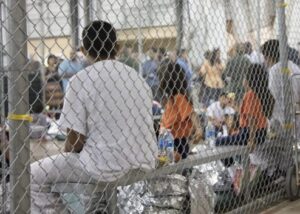This is an archive of prayers composed for, or relevant to, forced labor and captivity endured under a variety of conditions spanning chattel slavery, forced marriages and the plight of agunot, unjust imprisonment and hazardous living conditions of prisoners, and the welfare of hostages taken captive by terrorists and unlawful combatants in contravention of the laws of war. Click here to contribute a prayer you have written, in concern for those enduring slavery and captivity. Filter resources by Collaborator Name Filter resources by Tag Filter resources by Category Filter resources by Language Filter resources by Date Range
Psalms 67 is a priestly blessing for all the peoples of the earth to be sustained by the earth’s harvest (yevulah), and it is a petition that all humanity recognize the divine nature (Elohim) illuminating the world. Composed of seven verses, the psalm is often visually depicted as a seven branched menorah. There are 49 words in the entire psalm, and in the Nusaḥ ha-ARI z”l there is one word for each day of the Sefirat haOmer. Similarly, the fifth verse has 49 letters and each letter can be used as a focal point for meditating on the meaning of the day in its week in the journey to Shavuot, the festival of weeks (the culmination of the barley harvest), and the festival of oaths (shevuot) in celebration of receiving the Torah. Many of the themes of Psalms 67 are repeated in the prayer Ana b’Koaḥ, which also has 49 words, and which are also used to focus on the meaning of each day on the cyclical and labyrinthine journey towards Shavuot. . . . Categories: Tags: 42 letter divine name, a red ribbon, acrostic, אנא בכח Ana b'Khoaḥ, anxiety, barley, captives, cyclical, Divine name acrostic, first fruits, labyrinth, Psalms 67, Raḥav, shalmah, walled cities, wheat Contributor(s): “Aḥeinu” is the final prayer in a set of supplications recited on Mondays and Thursdays as the Torah scroll is being prepared to be returned to the Aron. The prayer is first found with variations in wording in the surviving manuscripts of the Seder Rav Amram Gaon (ca. 9th c.). . . . Categories: Tags: Contributor(s): This prayer for the liberation of abducted Israeli citizens and military personnel was offered by Rabbi Ofer Sabath Beit Halachmi in response to the war initiated by Hamas from Gaza on Shemini Atseret 5784. The English translation was prepared by Rabbi Dr. Rachel Sabath Beit Halachmi. . . . Categories: Tags: Contributor(s): This prayer for the captives was prepared for the Masorti Movement in Israel by the Knesset haRabanim b’Yisrael and disseminated in Hebrew, English, French, and Spanish. These were published online for the Masorti Solidarity Shabbat (27-28 October 2023). . . . Categories: Tags: Contributor(s): “Upon My Heart” was offered by Rabbi Menachem Creditor and shared via the Open Siddur Project discussion group on 20 November 2023. The added hashtag “#bringthemhomenow” helps to contextualize the prayer-poem, as written to express the yearning for the return of the captives taken hostage during the 7 October massacres by HAMA”S and its allies. . . . Categories: Tags: Contributor(s): This prayer for the well-being of the captives taken hostage by ḤAMA”S and its allies on 7 October 2023 was written by the Ashkenazi chief rabbi of the State of Israel, David Lau, and shared by his office in the month preceding Pesaḥ 2024. The prayer is intended to be read at the Passover seder in the Maggid section before והיא שעמדה (v’hi she’amda). . . . Categories: Tags: Contributor(s): |



